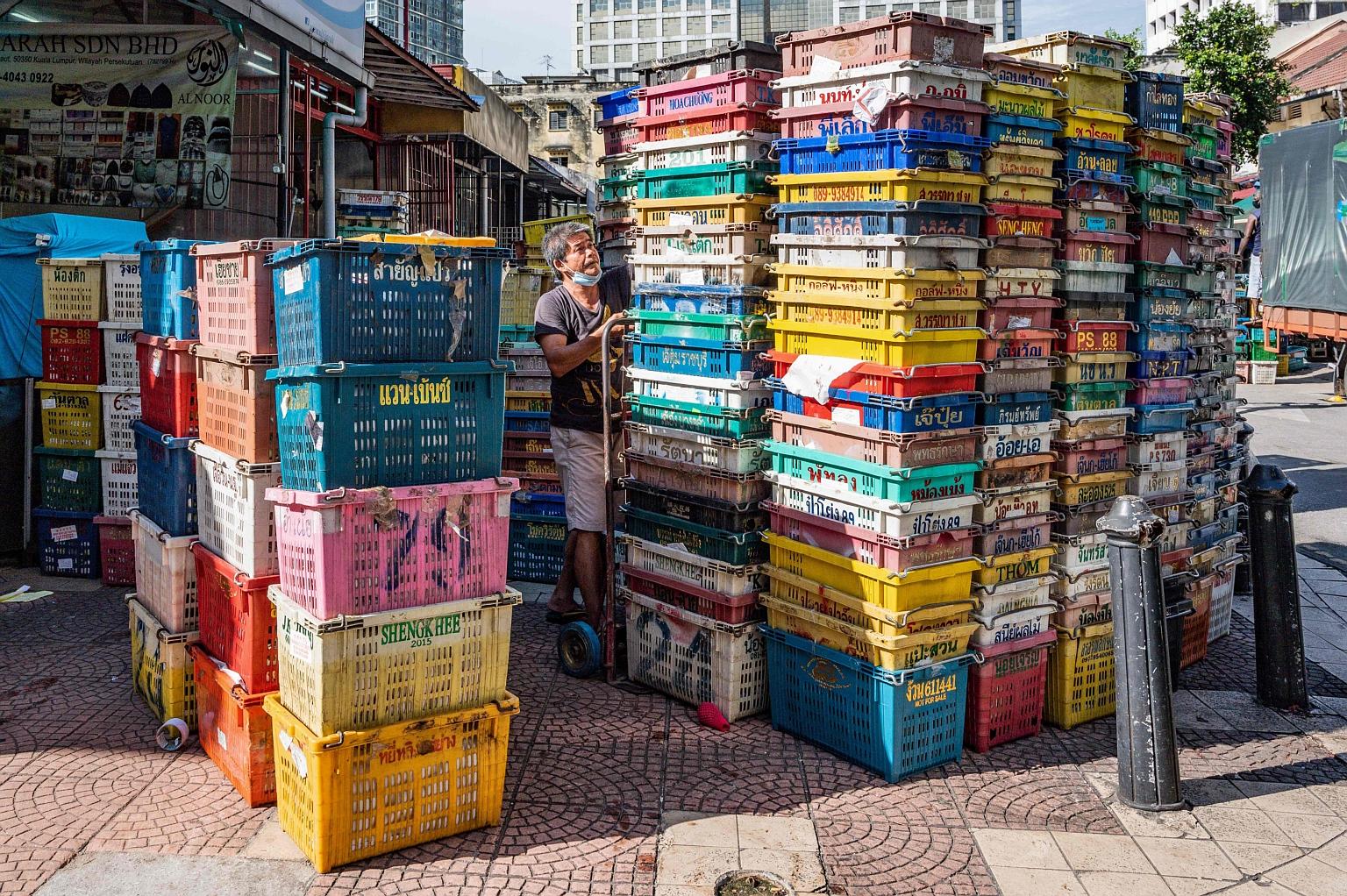Coronavirus pandemic
Coronavirus: Malaysian chief ministers hit back at Azmin over remark on lawsuit risk
Sign up now: Get ST's newsletters delivered to your inbox

A worker arranging empty crates at a fruit market in Kuala Lumpur on Monday. The federal government called for more businesses to reopen from Monday, but eight of Malaysia's 31 states said they needed further discussions at the state level to decide on this.
PHOTO: AGENCE FRANCE-PRESSE
Follow topic:
KUALA LUMPUR • The Sabah and Penang chief ministers have hit back at Malaysian International Trade and Industry Minister Azmin Ali, who said state governments could face lawsuits from businesses should they insist on continuing the movement curbs.
Datuk Seri Azmin wanted them to heed the federal government's call to reopen more businesses from last Monday, but the retorts from the state leaders reflect federal-state tensions over how fast to reopen the economy after six weeks of Malaysia's stay-at-home order to curb the coronavirus outbreak.
After Prime Minister Muhyiddin Yassin called for almost all economic sectors to reopen, while adopting precautions, eight of Malaysia's 13 states initially said they would continue with the movement control order (MCO) that was first imposed on March 18. They said they needed further discussions at the state level to decide when to reopen more.
Tan Sri Muhyiddin calls the economy's reopening "conditional MCO" or CMCO.
Mr Azmin, the second most senior person in the Cabinet after Mr Muhyiddin, warned last Monday that the states that chose not to allow more businesses to reopen could be sued by businesses.
Said Sabah Chief Minister Shafie Apdal: "This is not the time to argue about the law. What we are trying to do is save lives in Sabah."
He added, as quoted by Malay Mail online news yesterday: "What if someone dies and they sue us?"
Penang Chief Minister Chow Kon Yeow wrote in a Facebook post yesterday: "I wish to inform Senior Minister Datuk Seri Azmin Ali that the Penang state government and chief minister are ready to face any legal suits for protecting the 1.8 million Penangites."
Selangor Menteri Besar Amirudin Shari, meanwhile, said his state government would comply only with parts of the CMCO that it is comfortable with.
Sabah, Penang and Selangor are opposition Pakatan Harapan (PH) states, which had dutifully complied with the federal government's stay-at-home orders.
But the rebuffs to easing curbs on Monday also came from states controlled by Mr Muhyiddin's allies in Perikatan Nasional - Kelantan, Pahang, Melaka and Sarawak. The eighth state that resisted reopening most businesses quickly was PH-controlled Negeri Sembilan.
Under the MCO, Malaysians could leave their homes only to buy groceries, medicine, and food from restaurants that offer only takeaways.
Opposition leader Anwar Ibrahim, speaking about the lawsuit threat by Mr Azmin, said the states were not consulted about the reopening of more businesses.
"Who is this minister representing? Industries? Corporations? Under the federal system, states have the right to make decisions," Datuk Seri Anwar said in a live Facebook session yesterday. "What is wrong with negotiations? Negotiate with them. I don't think there would be a Menteri Besar or chief minister who is not concerned about unemployment issues."
Said former Johor Menteri Besar Mohamed Khaled Nordin, one of Umno's three vice-presidents: "This failure indicates significant weaknesses in leadership, strategy and coordination related to the restoration of the economy... This has complicated business and trade activity as Malaysia's economy is by nature cross-border."
Meanwhile, Prime Minister Muhyiddin has unveiled a six-pronged strategy in his government's battle to combat the effects of the coronavirus.
The six steps encompass resolving to stop the spread of the virus by controlling people's movement; ensuring the resilience of the economy; restarting it in an orderly manner; implementing an economic recovery plan; revitalising the economy; and structurally reforming it in a post-Covid-19 world.
Mr Muhyiddin added that while most economic sectors have been reopened, those involving close human contact and mass gatherings are still prohibited.
"This is the balancing act Malaysia is trying to achieve - between kick-starting our economy and the importance of adhering to new standard operating procedures to prevent another wave of infections among the population," he said at the online summit-level meeting of the Non-Aligned Movement Contact Group in response to Covid-19 on Monday.

